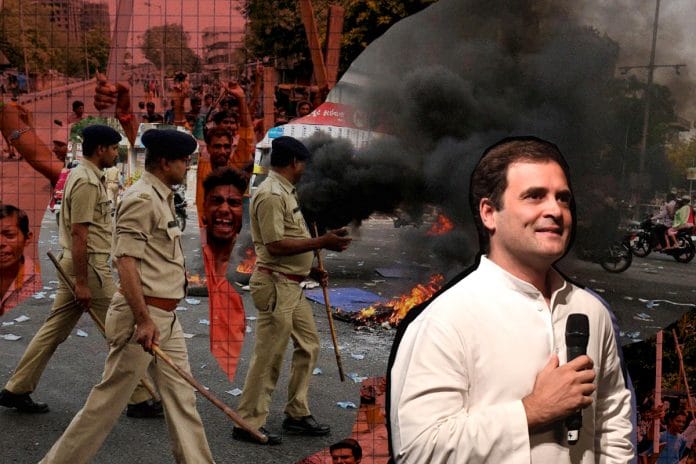Addressing a gathering at the Bucerius Summer School in Hamburg, Germany, Congress president Rahul Gandhi accused the BJP government of excluding minorities, Dalits and tribals from the “development process”.
Citing the example of ISIS, he said exclusion “could be a dangerous thing”. He also linked lynchings in India to unemployment. BJP spokesperson Sambit Patra said Rahul’s “veiled threat” is “unbelievable”.
ThePrint asks – Rahul Gandhi says excluded groups may turn to ISIS-like extremism: Realistic or alarmist?
India’s Muslims have shown little radicalisation, even after Babri and Godhra carnage
 Harsh Mander
Harsh Mander
Former IAS officer, and social activist
Rahul Gandhi was right about many things in his recent Hamburg speech. He was right to speak about the intense exclusion of India’s most vulnerable communities from the development process – the tribal communities, Dalits and India’s religious minorities, particularly Muslims.
He was right to stress the devastation that demonetisation wreaked on India’s poorest, and the suffering of tiny and small businesses due to demonetisation and the manner in which GST was rolled out. And, he was right on target to raise joblessness as one of India’s greatest crises because it robs India’s burgeoning youth of hope, dreams and a future.
But I take issue with his one observation. I don’t think the spectre of ISIS-like violence should be why we need to ensure justice to India’s Muslims and other oppressed people, or that such a spectre exists. India’s Muslims have shown little radicalisation, even after the Babri Masjid demolition, or after communal carnages such as in Gujarat and Muzaffarnagar, or after many innocent youths were jailed for long years on false charges of terror activities. They have instead continuously demonstrated their faith in India’s constitutional framework.
We do need to secure for India’s vulnerable and oppressed populations – its Adivasis, Dalits and Muslims – the four freedoms that Roosevelt had listed in 1941 – freedom of worship, freedom from want, freedom of speech and expression and freedom from fear.
It is because this was the promise that we the people of India made to everyone – of ensuring justice, liberty, equality and fraternity. And, for no other reason.
Muslim exclusion needs to be addressed in India-specific language of politics
 Hilal Ahmed
Hilal Ahmed
Associate professor, CSDS
Rahul Gandhi’s speech underlines three broad arguments.
First, he emphasises a direct relationship between growing economic disparities and collective violence in contemporary India.
Second, he argues that the policies of the ruling establishment, led by the BJP, are responsible for the economic debacle. The crisis of joblessness, he claims, leads to marginalisation and social unrest and creates an anti-minorities, anti-Dalits and anti-poor atmosphere.
Finally, Gandhi draws a broad inference that exclusion of certain groups would lead to the rise of radical politics and insurgent groups similar to the ISIS.
Rahul’s first argument is certainly valid. The economic disparities are often translated in social discontent. He is also right that policies such as demonetisation have contributed to violence against minorities, especially against Muslims.
However, Rahul’s conclusion is deeply problematic.
He is factually mistaken. Despite being a constitutional minority, Muslims of India are highly diversified. This is precisely the reason why it would be absolutely incorrect to think that the Hindutva rhetoric and lynching episodes would organise Muslims as an identifiable group against the state. Be it the Muslim League of 1940s or the All India Muslim Personal Law Board of 2018, Muslims do not respond in an overtly homogeneous way.
Various opinion polls have also suggested that the participation of Muslims in democratic politics is much higher than other communities, which shows that Muslims do have a strong faith in the constitutional politics.
The vicious circle of poverty, exclusion and extremism is an important formulation but it would be dangerous if it is interpreted only through the prism of conventional secular politics of the Congress. Muslims of India need to be addressed in an India-specific language of politics.
Also read: Today’s lesson for Rahul Gandhi: Anti-BJPism won’t be good enough for 2019
Rahul & his spin doctors are being reckless in selecting subjects for discourse
 Sandip Ghose
Sandip Ghose
Political commentator
Rahul Gandhi is on a high. Buoyed by his rising stock in opinion polls and, reportedly, the party’s own internal surveys, his statements are going from bold to bizarre. His statements in Germany were clearly over the top and bordering on irresponsible. If this is any indication of what to expect in the days to come, then there is reason to worry.
Opening two fronts simultaneously, one at home and the other overseas, is clearly part of the campaign strategy crafted by his advisers and consultants. While in India his line of attack has been to sully Narendra Modi’s image on corruption (example, Rafale), abroad he is trying to make an impression of being a cerebral and thoughtful politician.
The latter is to part-correct his earlier image of being immature and also to contrast himself with Modi by painting him in lurid right-wing strongman hues. He wishes to be seen as a nice man the diaspora and international community can trust. But in doing so, Rahul and his spin doctors are being reckless in selecting the subjects for discourse.
Rahul would have chosen the ISIS reference advisedly knowing its sensitivity in Europe. Coupling with another touchy issue of discrimination against minorities, which Islamophobic Europeans will at once relate to, he hoped to score a double bonanza. While it might have been a coldly calculated comment, one has serious doubts whether Rahul, as a challenger on steroids, really thought through the spill-over effect it would have back in India.
Without realising, Rahul has handed out another gift to the BJP and Narendra Modi on a platter for 2019.
Rahul’s comparison a false perception of Muslims, should be condemned
 Rahul Sonpimple
Rahul Sonpimple
Convener, BIRSA Ambedakar Phule Student Association (BAPSA)
In the present political environment, it has become a compulsion to speak about Dalits, tribals and Muslims. The minorities are effectively being excluded, and lynchings have become commonplace. Rahul Gandhi has to be conscious about issues that plague the minorities, or it will become difficult for his party to survive.
Ever since the BJP came to power, the agitation by Dalit organisations has intensified. But minorities have always been excluded. Even under the Congress governments, they did not find adequate representation. The Congress continues to remain a largely upper-caste party, especially in Maharashtra and Haryana.
But at least the Congress is making an effort. The RSS has only attempted to appropriate Ambedkar to consolidate the ‘Hindu vote’. They will not address the issues of different castes, separately.
However, Rahul’s comparison of these excluded minorities with ISIS extremists is incredibly insensitive. It is the minorities, more than anyone else, that believe in the mechanisms of the state. They are invested in the government and have hope from it.
What Rahul has voiced seems to be a false perception of Muslims. It propagates the kind of Islamophobia that should be condemned. He is the face of the Congress party, he should be very conscious about the words he chooses to address the minorities.
Rahul Gandhi’s postulation is correct but not smart politics ahead of 2019 polls
 Rama Lakshmi
Rama Lakshmi
Editor, Opinion, ThePrint
On the face of it, no one can disagree with Rahul Gandhi’s postulation. It’s a simple chain of events: the rising level of school and college education coupled with unemployment and income inequality creates social and cultural anxieties over time. This state of being estranged from the development and economic process can easily slip into a feeling of alienation and of deliberate, systematic exclusion.
This condition becomes readymade fodder for political and religious mobilisation. Radical ideologies – of extreme Right and Left – prey on what is called ‘the psychology of cultural disenfranchisement’.
In his seminal book on youth unemployment in contemporary India, Timepass: Youth, Class, and the Politics of Waiting in India, scholar Craig Jeffrey writes about how listless and aimless youth waiting for ‘something to happen’ are enlisted for all kinds of political work.
For instance, many scholars have traced the years of violence, extremism and separatism in Punjab to the post-Green Revolution farm crisis and youth unemployment. Politics of Sikh identity was easy to drum up in that context.
Rahul Gandhi was making a theoretical point in Germany.
But it is not smart politics in the current political context of polarisation to link unemployment and under-development to ISIS. His opponents and voters will not look at the nuances of his theory.
His speech to the crowds in India cannot be different from his speeches abroad – not in the run-up to what’s likely to be the most important election in his career. He should learn from Prime Minister Narendra Modi whose speeches abroad are aimed at winning votes and cheers back home in India.
The BJP, on its part, should also know that there is a difference between justifying and explaining extremism.
Compiled by Deeksha Bhardwaj, journalist at ThePrint. You can reach her @deekbhardwaj on Twitter.







Rahul Gandhi is Bullshitting in foreign land.
Does he say that the dalits, minorities and tribals were very happy under the long rule of Congress, and were not alienated ? If they were not alienated why are they still suffering after 70 years of independence, is it only because of the past 4 years they are suffering ? Strange reasoning, when travelling in an away country and playing to that regions’ sentimentalities
This Anglo Indian thug is already on bail for forgery and looting, shows did respect to India when ever gone abroad
Disparities would in long run would lead to alienation which can lead a section within the neglected group getting trapped with organisations which are against democracy it can be ISIS or any other under different names. It can happen whether government is under BJP or Congress